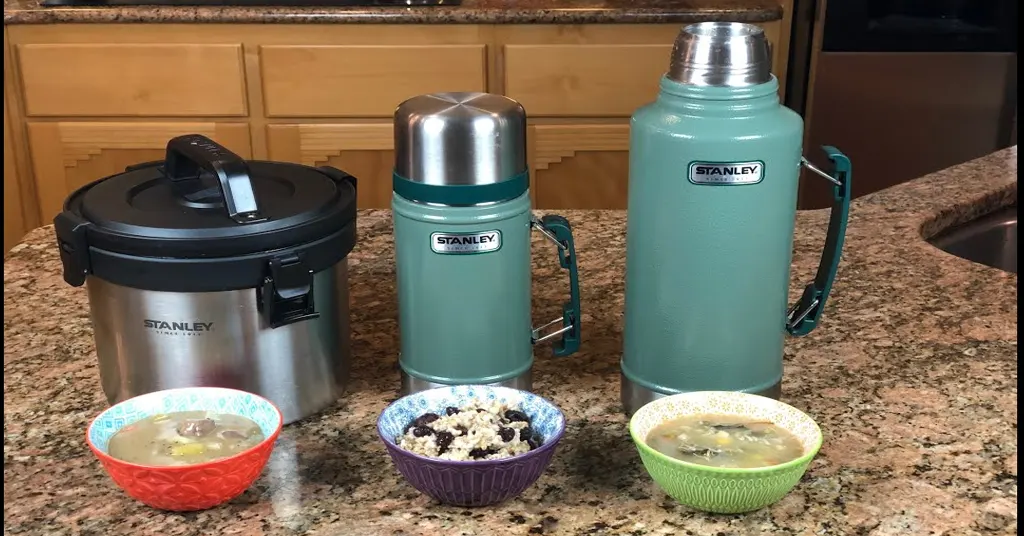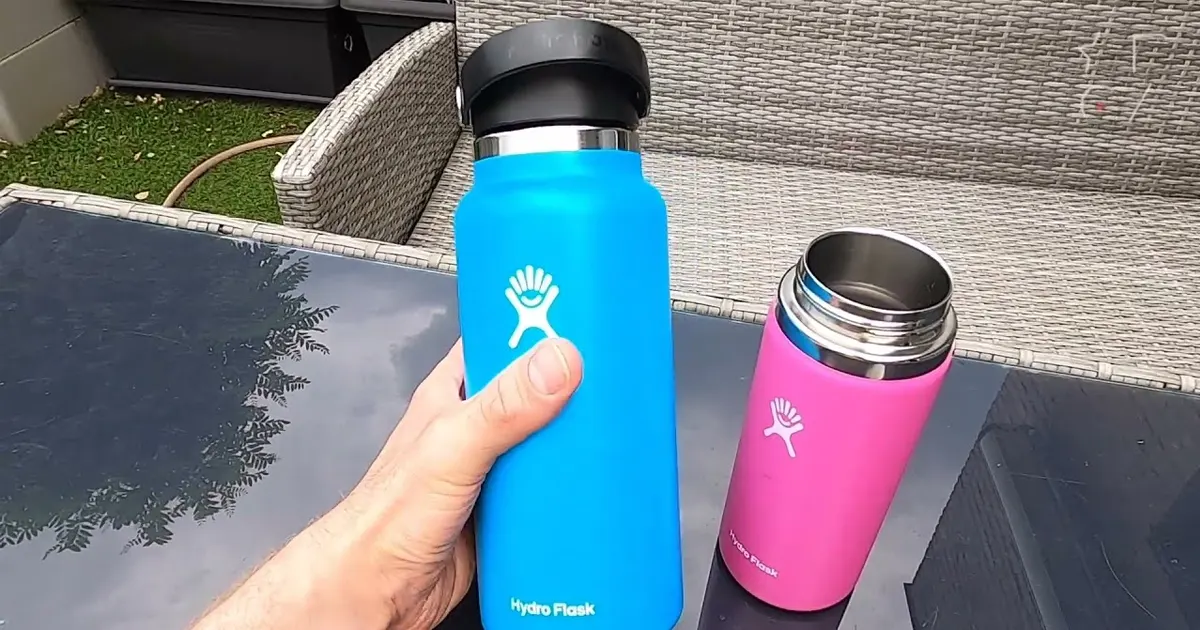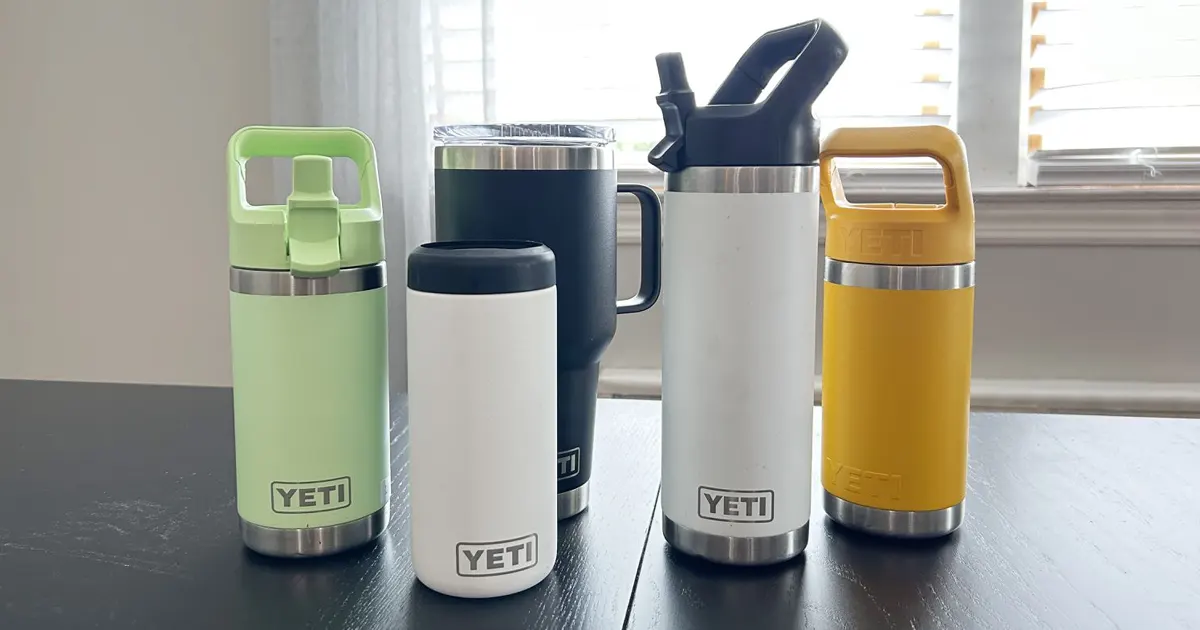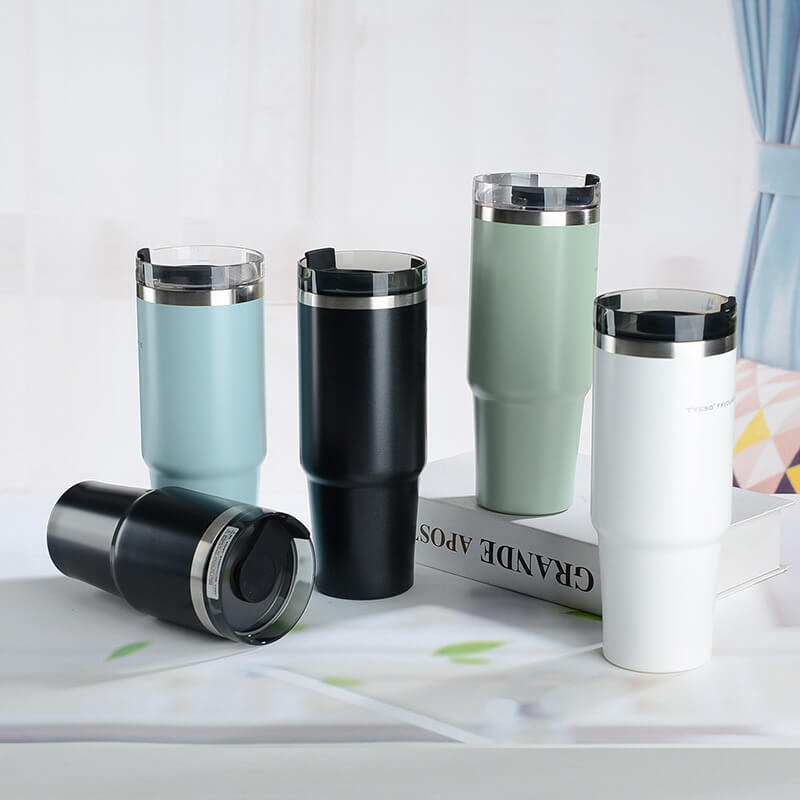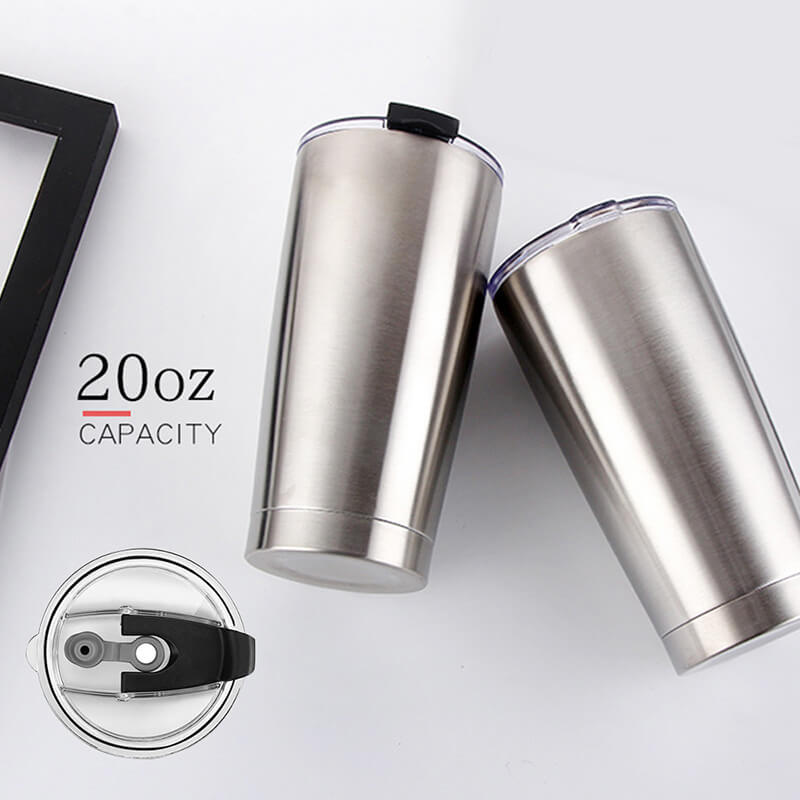Table of Contents
Best Surface Treatments for Custom Water Bottles
Custom insulated water bottles are a popular choice for branding, gifting, and retail, with stainless steel bottles leading the market for durability and sustainability. Surface treatment techniques, or color, material, and finish (CMF) processes, elevate these bottles with aesthetic appeal, functionality, and protection. This guide explores the top surface treatment techniques for custom water bottles, including spray painting, 4D printing, and water transfer printing, helping manufacturers, designers, and businesses create standout products.
Why Surface Treatments Matter for Custom Water Bottles
Surface treatments enhance custom water bottles by:
- Aesthetics: Vibrant colors, logos, and patterns boost brand visibility.
- Durability: Coatings protect against scratches, corrosion, and UV fading.
- Safety: Food-grade finishes ensure compliance with FDA and BPA-free standards.
- Functionality: Tactile grips or anti-slip surfaces improve user experience.
According to a 2025 Consumer Trends Report, 70% of buyers prefer customized water bottles with durable, eco-friendly finishes, driving demand for advanced CMF processes.
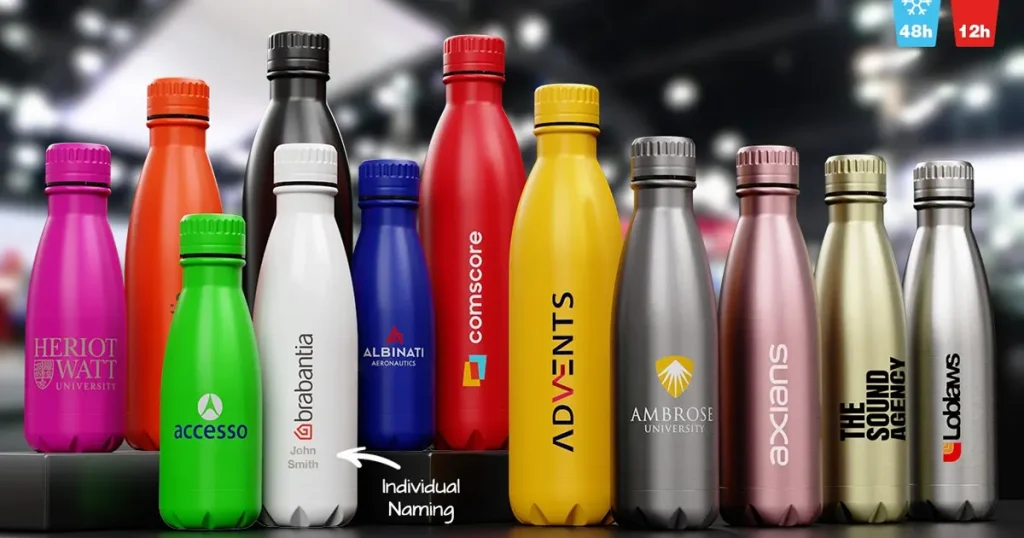
Common Surface Treatment Techniques
1. Spray Painting
Overview: Applies liquid paint via spray for glossy, matte, pearlescent, or gradient finishes.
Process:
- Clean bottle surface to remove contaminants.
- Apply primer, then spray paint in controlled booths.
- Bake at 120°C for 30 minutes to set (ASTM D3359).
Advantages:
- Customizable colors and textures (e.g., matte black, glossy red).
- Durable with 4H hardness (ASTM D3363, 2023).
- Cost-effective ($0.50-$1.00/bottle, Materials Journal, 2024).
Disadvantages:
- Potential VOC emissions; eco-friendly water-based paints recommended.
- Limited pattern complexity.
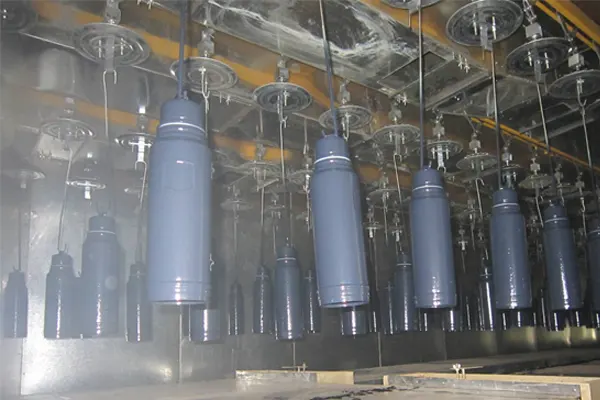
2. Spray Plastic Coating
Overview: Adds a polymer layer for enhanced grip and scratch resistance.
Process:
- Pre-treat bottle with plasma cleaning.
- Spray polyurethane or acrylic coating.
- Cure at 100°C for 20 minutes.
Advantages:
- Soft-touch or glossy finishes improve tactile feel.
- 30% higher scratch resistance than spray paint (ASTM D7027, 2023).
- FDA-compliant for food contact.
Disadvantages:
- Higher cost ($1.00-$2.00/bottle).
- Longer curing time.
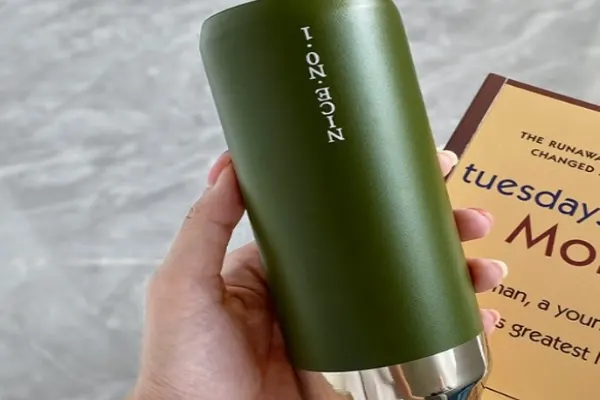
3. Silk Screen Printing
Overview: Transfers ink through a mesh screen for logos and designs.
Process:
- Create stencil with design.
- Apply ink to bottle surface via screen.
- Cure at 80°C for 15 minutes.
Advantages:
- Vibrant, high-resolution designs (up to 600 DPI).
- Durable against fading (500 wash cycles, SGS, 2025).
- Affordable for bulk orders ($0.30-$0.80/bottle).
Disadvantages:
- Limited to flat or semi-curved surfaces.
- Multi-color designs increase costs.
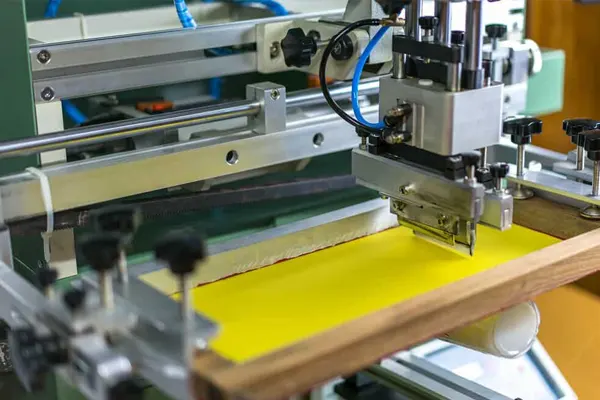
4. Thermal Transfer and Laser Marking
Overview: Applies heat-transferred designs or laser-etched patterns.
Process:
- Thermal Transfer: Print design on transfer film, apply with heat press.
- Laser Marking: Etch logos with high-precision lasers.
Advantages:
- Permanent designs resist wear (1000+ wash cycles, ASTM G195).
- Ideal for branding (e.g., logos, serial numbers).
- Eco-friendly with no VOCs.
Disadvantages:
- Higher setup costs ($2.00-$5.00/bottle for laser).
- Limited color options for laser marking.
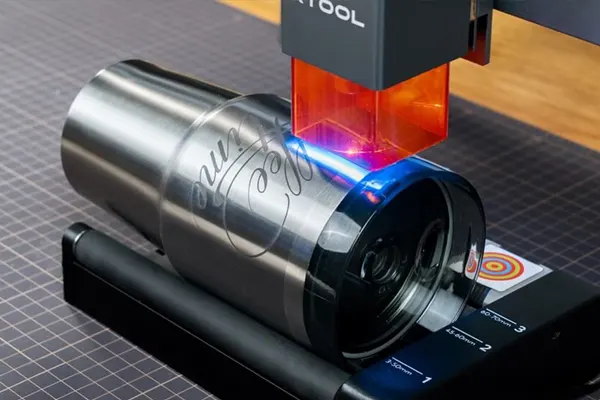
Advanced Surface Treatment Techniques
1. Ceramic Inner Paint
Overview: Applies water-based ceramic coating to the bottle’s inner surface for safety and durability.
Process:
- Clean and preheat bottle to 55°C.
- Spray ceramic paint (e.g., white, gray).
- Dry in tunnel at 100°C for 20 minutes.
- Inspect for defects (e.g., yellow spots) and sand if needed.
Advantages:
- Non-toxic, free of formaldehyde, benzene, and heavy metals (FDA, 2025).
- High hardness (6H) and adhesion (4H, ASTM D3363).
- Meets BPA-free and California 65 standards.
Disadvantages:
- Limited to inner surfaces.’
- Higher cost ($1.50-$3.00/bottle).
4D Printing (Color Carving Relief)
Overview: Uses automated software to create intricate, embossed designs without plate-making.
Process:
- Design patterns via software (no color number required).
- Apply via automated printing for relief effects.
- Cure at 90°C for 10 minutes.
Advantages:
- No plate-making fees, saving 20% vs. traditional printing (Industry Week, 2024).
- Fast proofing (1-day turnaround).
- Vibrant, accurate patterns (e.g., leather, abstract).
Disadvantages:
- Requires advanced equipment, limiting supplier availability.
- Higher initial setup cost ($3.00-$5.00/bottle).
3. Water Transfer Printing
Overview: Transfers patterns using water pressure for photo-quality designs.
Process:
- Spray primer and bake at 120°C.
- Place bottle in water with transfer film.
- Apply topcoat and bake at 160°C.
- Inspect and repair defects.
Advantages:
- Covers curved surfaces with seamless patterns.
- Supports complex designs (e.g., wood grain, photos).
- Applicable to metal, plastic, and ceramics.
Disadvantages:
- Pattern deformation on irregular surfaces (5-10% distortion, SGS, 2025).
- Higher cost for roll dyeing ($2.00-$4.00/bottle).
Air Transfer Printing
Overview: Sublimates patterns via high-temperature dyeing paper for vivid effects.
Process:
- Apply primer and topcoat (glossy/matte).
- Wrap bottle with dyeing paper.
- Bake at 180°C for 15 minutes.
Advantages:
- Seamless, vibrant patterns (e.g., marble, 3D relief).
- Supports multiple materials (metal, fabric, wood).
- High durability (800 wash cycles, ASTM G195).
Disadvantages:
- High-temperature baking increases energy costs.
- Complex setup ($2.50-$5.00/bottle).
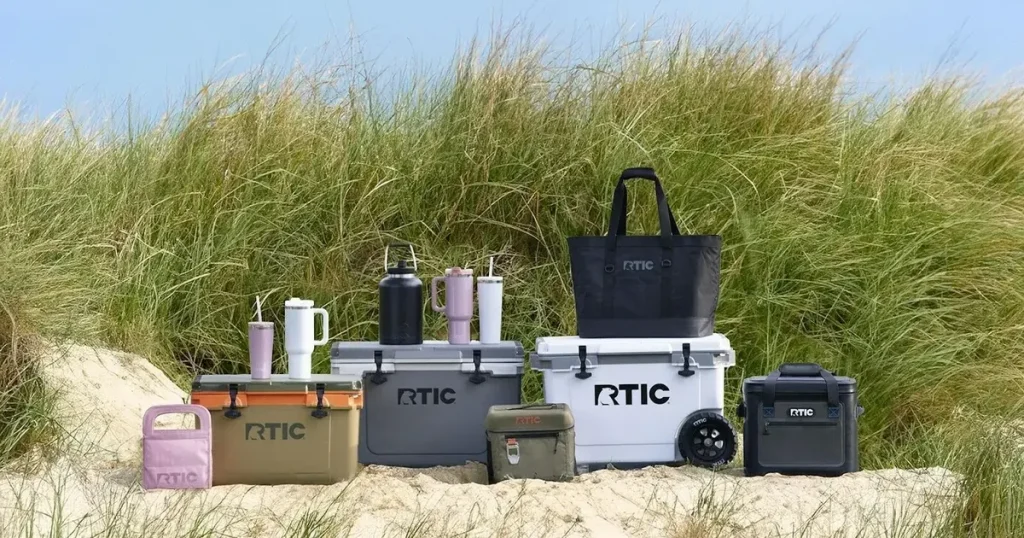
Comparing Surface Treatment Techniques
| Technique | Cost/Bottle | Durability | Eco-Friendliness | Best For |
|---|---|---|---|---|
| Spray Painting | $0.50–$1.00 | 4H hardness | Moderate (use water-based) | Budget branding |
| Spray Plastic Coating | $1.00–$2.00 | 5H hardness | Moderate | Tactile finishes |
| Silk Screen Printing | $0.30–$0.80 | 500 cycles | High | Logos, bulk orders |
| Thermal/Laser | $2.00–$5.00 | 1000+ cycles | High | Permanent branding |
| Ceramic Inner Paint | $1.50–$3.00 | 6H hardness | High | Food-grade interiors |
| 4D Printing | $3.00–$5.00 | 800 cycles | Moderate | Premium designs |
| Water Transfer | $2.00–$4.00 | 600 cycles | Moderate | Curved surfaces |
| Air Transfer | $2.50–$5.00 | 800 cycles | Moderate | Vibrant patterns |
Key Considerations for Choosing Surface Treatments
- Cost: Spray painting and silk screen printing are budget-friendly; 4D printing and laser marking suit premium projects.
- Durability: Ceramic paint (6H) and thermal transfer (1000+ cycles) offer the longest lifespan.
- Sustainability: Water-based paints and laser marking reduce VOC emissions; prioritize FDA-compliant materials.
- Aesthetics: 4D printing and water transfer excel for complex, vibrant designs.
- Application: Match techniques to bottle use (e.g., ceramic paint for thermos, water transfer for retail).
Environmental and Regulatory Considerations
- Eco-Friendliness: Spray painting emits VOCs (up to 500 g/L); water-based alternatives emit <50 g/L (EPA, 2024). 4D printing and laser marking are low-waste options.
- Compliance: All treatments must meet FDA, BPA-free, and California 65 standards for food contact. Third-party tests (e.g., SGS) verify compliance.
- Sustainability Trends: 60% of brands prioritize eco-friendly coatings in 2025, per Consumer Trends Report, boosting demand for water-based and recyclable finishes.
FAQs About Surface Treatments for Custom Water Bottles
What are the best surface treatments for custom water bottles?
Spray painting and silk screen printing are cost-effective; 4D printing and water transfer offer premium designs.
Are water bottle coatings safe for drinking?
How durable are custom water bottle finishes?
Which surface treatment is eco-friendly?
How much do custom water bottle treatments cost?
Can surface treatments cover curved water bottles?
What’s the difference between 4D printing and traditional printing?
Conclusion: Choosing the Right Surface Treatment
Surface treatment techniques for custom water bottles, from spray painting to 4D printing, offer endless possibilities for aesthetics, durability, and functionality. By balancing cost, sustainability, and design needs, businesses can create standout products for branding, retail, or outdoor use. Compare techniques like silk screen for affordability or water transfer for vibrant patterns, and prioritize FDA-compliant, eco-friendly finishes to meet modern standards. Elevate your custom water bottles with the right CMF process today.
More questions? Please feel free to contact YKSC, the leading vacuum insulated stainless steel water bottle manufacturer. Send an email to [email protected], you will get quick response within 24 hours.
Have Anything To Ask Us?
Please fill in the detailed information in the form, and we will contact you as soon as possible
